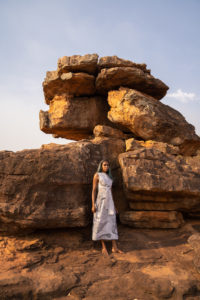Melbourne Fashion Week returned with a bang in 2022, with many First Nations designers, models, creative directors and artists at the helm.
This year, a remote studio in West Arnhem Land was behind a new couture collection on the Ganbu Marra runway.
Injalak Arts in collaboration with designer Ally Beahan designed a one-off collection revealed on the runway.
The studio at Injalak in Gunbalanya, West Arnhem Land has seen new additions of two 14 metre printing tables and has increased the capacity in the studio to produce artisan fabrics.
Injalak Arts is one of very few hand-printed textile operations across Australia which provides an alternative to bulk printing.
 Velda Nabulwad wearing injalak fabric designed printed and constructed in Gunbalanya. Photo credit: Nina Haigh courtesy Injalak Arts.
Velda Nabulwad wearing injalak fabric designed printed and constructed in Gunbalanya. Photo credit: Nina Haigh courtesy Injalak Arts.
Injalak arts manager Michael Stitfold said working alongside Beahan to produce this collection was a spur of the moment thing.
"It turns out that Ally was on staff, she came up here from Melbourne," he said.
"She applied to come and work in Injalak and this opportunity came on the back of the work we did in Darwin, the Darwin Indigenous Fashion Show.
"We were invited to participate in Melbourne and Ally was out here already and said she can do it and she sewed up the work out here on community.
"So the whole thing was printed and produced and made here in Gunbalanya."
[embed]https://www.nit.com.au/paul-mccann-closes-melbourne-fashion-weeks-ganbu-marra-with-one-of-a-kind-masterpieces/[/embed]
Stitfold said showing at Melbourne Fashion Week is a great way to showcase their artists' works.
"The Indigenous textiles market is really gaining traction and we are expecting to see an increase in demand that these upgrades will allow us to meet," he said.
"Being able to display at Melbourne Fashion Week is a great way to stimulate demand in our work and get our two new tables really firing with quality lengths of hand printed textiles.
"There is a real appreciation for hand printed fabrics from the source and buyers are really looking for unique products that show a social conscience."
Upgrades to Injalak Arts were co-funded by the Northern Territory and Australian governments, with the NT contribution funded through its $30 million Arts Trail Gallery Extension Program.




